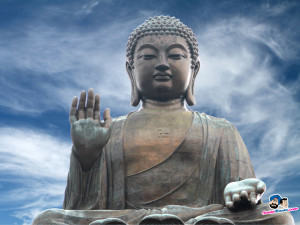I once read of some wise saying: “Don’t go where the road takes you, go where there is no road and leave a mark there”. At the time a first read it, about two years ago, it honestly didn’t make much sense. It’s only recently when I accidentally came across a similar Asian expression that it resurfaced in my memory. This time round it did ring a bell in my mind and, believe me not, it became the theme for my reflection during our just concluded Annual Retreat (1st – 5th June 2015).

As I parked my bag for the Annual Retreat, I grabbed one of the books recently given to me by an American nun who has been working in Taiwan for the past 25 years. The book is entitled “YOUR JESUS! MY BUDDHA!” To be honest I didn’t know why the nun specifically chose this book to give me as a gift; however, after reading it during the annual retreat, I came to guess what might have been at the back of her mind. It seems to me that it had a lot to do with “going where there is no road and leaving a mark there”, as the author of the above mentioned book evidences about the lives of Both Jesus and Buddha.

At this juncture I am sure that you have already begun to disagree with me, or rather the writer of the book, especially if you are of Christian background. The typical questions in your mind will automatically be: how dare you equate Jesus with any other being of human origin?; Who is the Saviour of the whole universe if not Jesus alone?; Who is Buddha to be compared with the son of God?; etc. Well, you are right to think like that, even me I did at least before reading deeply the above mentioned book. I mean, from our (Christian) point of view all the above questions (and even more) are quite legitimate; what about from their (the Buddhists’) point of view?
 Now this is the hardest part to handle, and yet it is exactly what characterizes the mission in Asia today: “Interreligious Dialogue”. This is a very respectable pastoral area that requires a lot of humility as well as mutual respect. As I was reading ahead, I felt more like in a similar situation with Moses who, having found himself in front of the burning bush, remained speechless and could only afford to be amazed. Of him was demanded an attitude of total humility: “Moses, Moses… come no nearer; take off your sandals; the place where you are standing is holy ground” (Ex 3:4-5).
Now this is the hardest part to handle, and yet it is exactly what characterizes the mission in Asia today: “Interreligious Dialogue”. This is a very respectable pastoral area that requires a lot of humility as well as mutual respect. As I was reading ahead, I felt more like in a similar situation with Moses who, having found himself in front of the burning bush, remained speechless and could only afford to be amazed. Of him was demanded an attitude of total humility: “Moses, Moses… come no nearer; take off your sandals; the place where you are standing is holy ground” (Ex 3:4-5).
Jesus’ coming to the world was an act of immeasurable courage, plunging himself into the unknown (since this was the first time a mission of this kind would be carried out in the land of the living). He relinquishes his normal divinely rhythm proper of his nature as God and assumes the likeness of men… (Phil 2:6-11). He did this in order to leave a mark in the hearts of men and women, the mark of salvation.
Buddha too comes up at a time when there was a real thirst for spiritual and moral guidance, especially in the Asian world. He comes up well before Jesus was born (563 BC) and so the impact was so great in the major part of the Asian world. He literally begins from nowhere and, as a fruit of his reflection and meditation, arrives at the state of being awakened / enlightened (Nirvana). From there he begins to teach all his disciples the fruits of his enlightenment; again, Just like Jesus, leaving a big spiritual and moral mark in the hearts of the people.
This is exactly the situation facing the pastoral agents in Asia today. Just like Moses, we are being asked to carry out a mission which, as you can well imagine, is quite delicate; however, one thing is clear to us: that the Lord will always lead the way. In the preface of the book there is a bold expression of this point:
“Interreligious dialogue, like intercultural dialogue, can only happen when those would participate have expended their comfort zones so that they can engage without feeling threatened or without feeling a need to threaten others. This can only happen when one is truly comfortable in one’s own ‘skin’, for only then is one likely to have the courage to set out on a voyage of discovery with a heart fully open to learning about and from others.” (Preface 7)
Challenged by this reality as expressed in the above quotation, I have come to learn one great fact: that we always come to appreciate what we have when we lose it. Upon the encounter with these other religions, little known in the western worlds and yet incredibly powerful in the Asian world, I have come to appreciate even more what I believe in. I consequently feel the need to deepen my knowledge of the same for a better and more fruitful dialogue with my most respected members of the other religions.
What a tempting endeavour! Tempting because we all tend to believe that our point of view is the best and so we engage in a monologue instead of a dialogue; however, we pray for the wisdom and guidance from God. In this process and probably very unconsciously, we shall hopefully be leaving some marks in the hearts of those we meet and share our faith with, either by words or deeds.
This is how complex the famous “Interreligious Dialogue” can be, but on the other hand I am subscribed to this line of thought as I did mention at the beginning of this article: “Don’t go where the road leads you, go where there is no road and leave a mark there”.

Leave a Reply